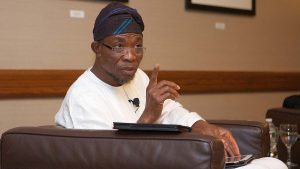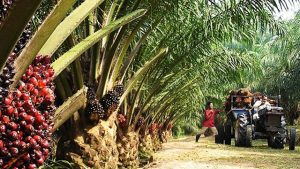WORLD BANK 2020 FACILITY AS NEEDED INTERVENTION FOR HERDERS-FARMERS CRISIS IN NIGERIA

World Bank on glass building. Mirrored sky and city modern facade. Global capital, business, finance, economy, banking and money concept 3D rendering animation.
I want to appeal to World Bank as Nigeria’s $1.5 billion facility would be placed before the World Bank Board for approval, next week, that the facility was prepared to assist states in the tackling COVID-19 and to address governance issues. World Bank’s $1.5 billion credit facility for Nigeria could be the solution to herders-farmers conflicts in Nigeria. I want to appeal to World Bank to channel the fund to agriculture for the provision of water which has been the main cause of herders-farmers clashes across Nigeria. World Bank could use this credit facility for a project to construct water channels and pump water from the Southern parts of Nigeria to Northern parts. Pumping of water for herders-farmers use in Nigeria will eliminate the perennial conflicts between farmers and herders in Nigeria. The project will reduce the ethnic tension and poverty across Nigeria. I want to appeal to World Bank to use the facility to stop the chorus of herders-farmers conflicts which have been a reoccurring decimal in Nigerian history.
Water represents a major constraint on agricultural productivity and rural poverty reduction in Nigeria. The vulnerability of rural people, herders-farmers remain considerable owing to a combination of: highly variable and erratic precipitation; poor development of hydraulic infrastructure, management and markets; non-conducive land and water governance; and a lack of access to water for domestic and productive uses. World Bank’s $1.5 billion credit facility for Nigeria should take stock of past experiences and demonstrates that there are many opportunities to invest in water in support of rural livelihoods. World Bank should aim to help Nigerian decision-makers make informed choices on where and how to invest. World Bank should emphasize the need for an approach where investments in infrastructure are matched with interventions in institutions, knowledge and finance in ways that yield optimal returns in terms of poverty reduction. World Bank should highlight the extreme heterogeneity of situations facing rural people across Nigeria and the diversity of challenges and opportunities facing different categories of rural operators, and the need to adapt responses to these realities. World Bank should recognize the multiple dimensions of the rural water challenge, and shows how people’s livelihoods depend on reliable water sources for a wide variety of uses.
World Bank should remind the government’s ambition of lifting 100 million Nigerians out of poverty by 2030 that would be challenging even under normal circumstances. The onset of the COVID-19 crisis has made the task much more challenging and urgent because of the severity of the economic downturn and the decline in fiscal resources.
Insecure access to water for consumption and productive uses is a major constraint on poverty reduction in rural areas of Nigeria. For millions of smallholder farmers, fishers and herders in Nigeria, water is one of the most important production assets, and securing access to and control and management of water is key to enhancing their livelihoods. This appeal to World Bank argues that the potential exists for well-targeted, local interventions in water that contribute to rapid improvement in the livelihoods of the rural poor in Nigeria and help attain the Millennium Development Goal of eradicating extreme poverty and hunger.
World Bank should discuss with the Nigeria government conditions for success and proposes water-based, context-specific, and livelihood centred approaches to poverty reduction in rural areas. Given the predominance of rural poverty in Nigeria, and given that agriculture will remain the main source of livelihood, poverty reduction strategies and World Bank should needs to focus on improving productivity in this sector. World Bank and Nigeria should focus on agricultural water because: (i) it plays a central role in agriculture based rural livelihoods; (ii) adequate availability and reliable access to water is frequently a constraint on production; and (iii) water provides a focal point around which other interventions can be organized.
According to World Bank: Agricultural development is one of the most powerful tools to end extreme poverty, boost shared prosperity and feed a projected 9.7 billion people by 2050.World Bank 2020 credit facility could be a major player to end poverty among herders-farmers in Nigeria. Growth in the agriculture sector is two to four times more effective in raising incomes among the poorest compared to other sectors. Analyses in 2016 found that 65 percent of poor working adults made a living through agriculture.
Agriculture is also crucial to economic growth: in 2018, it accounted for 4 percent of global gross domestic product (GDP) and in some developing countries, it can account for more than 25% of GDP. But agriculture-driven growth, poverty reduction, and food security are at risk: Climate change could cut crop yields, especially in the world’s most food-insecure regions. Agriculture, forestry and land use change are responsible for about 25 percent of greenhouse gas emissions. Mitigation in the agriculture sector is part of the solution to climate change.
By
Inwalomhe Donald writes via inwalomhe.donald@yahoo.com
![]()



